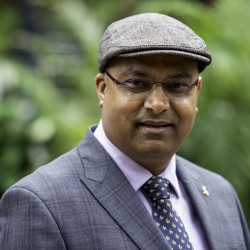First phase of Heat-Cool initiative successfully completed
GCARE researchers brought their Heat-Cool programme to Guildford County School in February, concluding the first phase of this successful initiative which takes a practical approach to teaching children about the impact of local heat sources on climate change.
During the visit by GCARE (Global Centre for Clean Air Research) on 1 February, students from years 7 to 9 got the chance to explore the drivers of climate change by getting hands on with practical experiments and interactive learning. Taking a ‘citizen science’ approach, they used thermal imaging technology to get a real-time visualisation of heat transfer between physical objects and the environment, as well as taking part in fun quizzes and watching engaging videos. GCARE researchers worked with the school’s teachers to create and implement the sessions.
The day not only communicated to the importance of taking control measures to combat climate change, it also proved a great way of sparking students’ curiosity about STEM (science, technology, engineering and mathematics) subjects.
The initiative at Guildford County School concludes the first phase of GCARE’s Heat-Cool initiative which was first carried out successfully at Henry Fawcett Primary School in London, followed by two more schools in Guildford – Holy Trinity Pewley Down (primary) and Royal Grammar School (secondary) in 2021. Findings from this first phase of the initiative will enable GCARE to develop a reproducible framework which can be used with schools worldwide through e-learning.
Steve Smith, Head Teacher at Guildford County School, said: “This initiative has been fantastic for all the students involved. They have definitely learnt new things, but more importantly have asked more questions and are eager to learn more about climate change.”
Professor Prashant Kumar, founding Director of GCARE, commented: “Interest in STEM subjects is declining in the UK, but playful initiatives like this can help unleash students’ interest in climate change and its impact on our planet. I’m very pleased to see the positive uptake by schools. Following this first phase, we plan to continue rolling the Heat-Cool programme out to other schools in the UK and internationally.”
PhD researchers Jeetendra Sahani and Nidhi Rawat added: “Nurturing environmentally-friendly habits at a young age is vital to combatting the problems the earth faces today and tomorrow. We feel proud to be part of this initiative which will not only motivate students to build their technical skills and possibly influence their future career choices, but will also ensure they become the good citizens we need for the future of our planet.”
Heat-Cool is supported by the Royal and Sun Alliance under the Climate Change and Risk Education grants among other funding.



